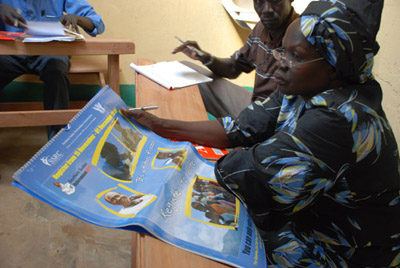
KAKUMA REFUGEE CAMP, Kenya — Will the South Sudan referendum actually take place on January 9? It’s the question on the minds of activists, journalists, and analysts covering Sudan these days, not to mention countless Sudanese living in the country and abroad. Sudanese officials pledge to not delay, but with less than two months to go, the outstanding logistical and political challenges are significant.
But this week marked an important milestone in the countdown – both logistically and symbolically.
Registration booths opened to start collecting the names of eligible voters and issuing fingerprinted voter cards. It was the biggest story out of Sudan this week, with reports describing jubilant scenes unfolding throughout the South.
I spent the days leading up to the registration at Kakuma, a refugee camp in northern Kenya that first opened in 1992 to accommodate the tens of thousands of Sudanese refugees fleeing the civil war. At its height, the U.N. refugee agency assisted more than 75,000 southern Sudanese refugees in Kenya, the vast majority of whom lived in Kakuma. Among the camp’s residents were Sudan’s Lost Boys—who fled across the border after being orphaned or separated from their families—including, most famously, Valentino Achak Deng from the bestselling book What is the What.
Today, an estimated 22,000 Sudanese live in Kakuma, and for the first time in their lives, they too will take part in the historic vote.
When my colleague and I landed in Kakuma on Friday, a team from the International Organization for Migration, or IOM, had just arrived to start preparations for the southern referendum – a significant undertaking among a community with no prior experience with formal voting. Registration was scheduled to start just a few days later, but the Southern Sudan Referendum Commission, a body plagued by political wrangling, was still working out some details about the process.
Over the course of a weekend, the IOM trainers and the local team selected to serve as civic educators and polling staff needed to be quickly trained on registration procedure, educate the wider community about the coming event, and prepare two registration stations – a primary school and an out of use health clinic – to accommodate a stream of would-be voters. The registration period spans two weeks, but referendum officials said they expected a big turnout in the first few days, once word got out about the exciting process.
Countrywide elections in Sudan earlier this year were in many ways – for better or worse – a trial run for the southern referendum. However, the Sudanese in Kakuma didn’t participate. The IOM training team comes from all over the world, with extensive experience working in challenging election environments. I asked one of the trainers how the South Sudan process compares to ones he assisted with in the Balkans, Afghanistan, and Egypt. “This? This is incomparable,” he said.
But by the end of the weekend, he and the other trainers marveled at how quickly their local teams had picked up the procedures. Sitting around a circle in a bright room at the former health clinic, seven Sudanese refugees were trained as civic educators. They rehearsed their presentations on how registration would work using colorful illustrations in a flipchart and role-played how to respond to questions they might hear in the community. After just two days of training, they fanned out in the camp on Sunday morning to start raising awareness among crowds gathered for church services. Another 40 or so more people would man the registration booths and, in January, the polling stations. They took turns interviewing each other to prove southern Sudan origin, filling out mock voter registration cards, and inking fingers.
Part of the reason my colleague and I traveled to Kakuma for this occasion was that we expected to hear strong opinions about the referendum from a community of people who had been displaced, sometimes multiple times, by violence in Sudan. What we found was that many people knew nothing of the vote between unity and secession. Even one of the civic educators we spoke to, who asked to have his name withheld because IOM staff is not authorized to speak to the media, said that he remembers when the Comprehensive Peace Agreement was signed in 2005, ending the civil war. But by then he had already lived in Kakuma for a few years and didn’t often get news from home. When he recently learned about the referendum and realized he too would have a chance to cast a vote, he was eager to get involved in efforts to educate fellow Sudanese about the process.
The refugees on the local team have short-term, paid contracts with IOM, but many people said they would do the work for free.
As posters advertising voter registration went up in Kakuma, the excitement was contagious. IOM had to keep reminding the local staff that they are obligated to remain neutral, which of course is difficult. As word spreads about the coming referendum, everyone has a strong opinion about the prospects the vote raises for eventually being able to return home.
A version of this post originally appeared on Change.org's Human Rights blog.

